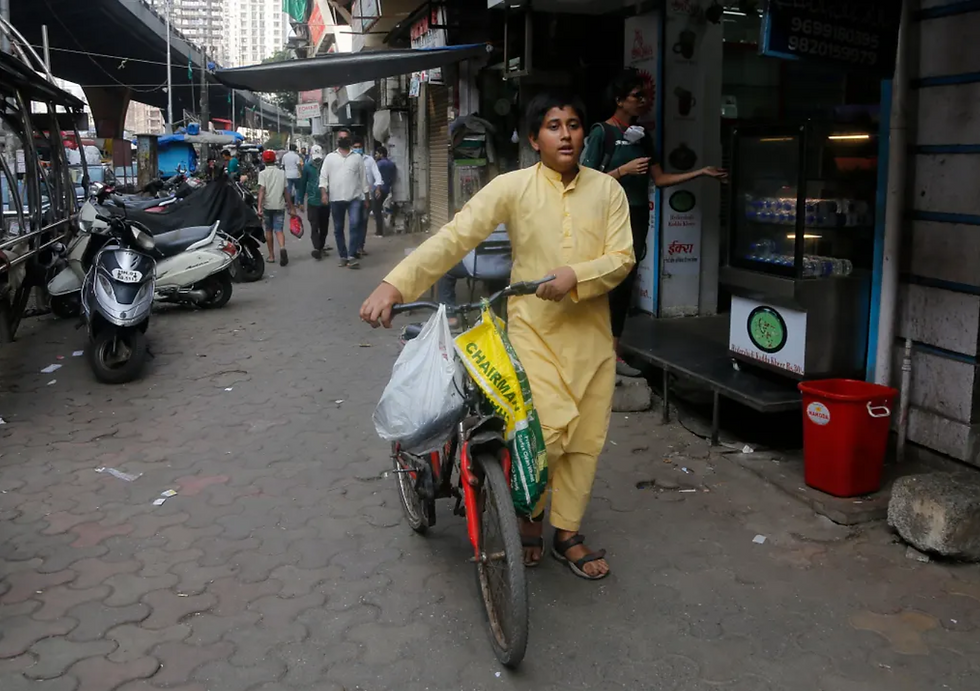Still Children?
- Aashika

- Nov 16, 2020
- 2 min read
Updated: Nov 17, 2020

COVID-19 has affected virtually every country in the world in one way or another, but has arguably hit less developed countries (LDCs) considerably more. Many economists believe that there will be an additional 33 million people living in extreme poverty in these countries post-COVID. But what does that mean for children?
Recently, an article in The Guardian was published titled "from schoolboy to tea seller." Subhan Shaikh, a 14-year-old Indian, decided to take matters into his own hands after noticing his mother struggle to provide for him and his two sisters when COVID-19 hit. Instead of spending 8am-3pm learning crucial skills that will allow him to prosper in the future in high school, he works until 10pm selling tea in the streets of Mumbai.
However, Subhan's story isn't unique, as due to the limited transfer payments available to the rural population of LDCs, many families are stuck in the same position. "Ten-year-olds are now mining sand" and others working in cocoa plantations in West Africa, The New York Times reports. While Subhan hopes to work towards his dream of becoming a pilot by attending school again soon, this is highly unlikely.
While schools begin to open-up again as the spread of the virus is contained, many children will still not have the opportunity to return to their normal lives, meaning they will be unable to attend school due to new family responsibilities like taking care of younger siblings or their parents' lack of income. This is significantly reversing years of progress made to encourage children, especially girls, to stay in school in these countries. Some predict that one of the major consequences will be the increase in child marriage in countries like India, where parents don't have the income to provide for their children and feel forced to "marry them off."
If children can't go to school, can't fulfil their heart's desires, and are forced to work and marry, are they still children?
I think not.
However, all hope is not lost. There are multiple organizations working around the clock to ensure these children don't have to face these responsibilities so early in their life. While some work to help underprivileged families through donations for food supplies, others directly target access to education by arranging online classes for these children. Particularly working in India, the Miracle Foundation and Wockhardt Foundation help bridge the gap between children and technological accessibility in rural areas. Every donation means one extra child will not have to work to provide for their family. Please advocate for this cause and donate whenever possible. Though these are trying times, we have the potential to make a big difference in someone's life. Remember, change starts with you.
External Resources
The article:
For more information:
Organizations to donate to:
Works Cited
“From Schoolboy to Tea Seller: Covid Poverty Forces India's Children into Work.” The Guardian, Guardian News and Media, 10 Nov. 2020, www.theguardian.com/global-development/2020/nov/10/from-schoolboy-to-tea-seller-covid-poverty-forces-indias-children-into-work.
Gettleman, Jeffrey, and Suhasini Raj. “As Covid-19 Closes Schools, the World's Children Go to Work.” The New York Times, The New York Times, 27 Sept. 2020, www.nytimes.com/2020/09/27/world/asia/covid-19-india-children-school-education-labor.html.
Pathak, Sushmita, and Lauren Frayer. “Child Marriages Are Up In The Pandemic. Here's How India Tries To Stop Them.” NPR, NPR, 5 Nov. 2020, www.npr.org/sections/goatsandsoda/2020/11/05/931274119/child-marriages-are-up-in-the-pandemic-heres-how-india-tries-to-stop-them.
“When It Rains It Pours: COVID-19 Exacerbates Poverty Risks in the Poorest Countries.” UNCTAD, 4 May 2020, unctad.org/news/when-it-rains-it-pours-covid-19-exacerbates-poverty-risks-poorest-countries.



Comments